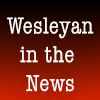Wesleyan in the News
 In this recurring feature in The Wesleyan Connection, we highlight some of the latest news stories about Wesleyan and our alumni.
In this recurring feature in The Wesleyan Connection, we highlight some of the latest news stories about Wesleyan and our alumni.
Recent Wesleyan News
- Gizmodo: “What’s the Oldest Disease?”
Douglas Charles, professor of anthropology, professor of archaeology, says “we don’t know” the answer to this question because of limitations in fossil records. However, he says that there are indications of tuberculosis, leprosy and tumors found in ancient human and Homo erectus skeletons.
- The Middletown Press: “Wesleyan University to Move 90 Employees to Main Street Middletown”
Wesleyan’s University Relations staff and most Finance staff will move to the Main Street building as part of the University’s strategic facilities plan. This move further strengthens ties between the University and the community.
2. The Wall Street Journal: “Five Best: Andrew Curran on Intellectual Freedom”
Andrew Curran, the William Armstrong Professor of the Humanities, chair of Romance Languages and Literatures, and author of the recent book, Diderot and the Art of Thinking Freely, recommends “works about authors who challenged their age.”
3. The Scientific News: “Carbon Dioxide (CO2) Is Not Our Grandparents’ Pollutant”
Gary Yohe, the Huffington Foundation Professor of Economics and Environmental Studies, and collaborators explain why “it is wrong to think that greenhouse gasses are similar to other atmospheric or water borne pollutants like sulfur from power plants, smog-causing components of auto exhaust, etc.”
Recent Alumni News
- STAT News: “Their Baby Died during His Nap. Then Medical Bureaucrats Deepened the Parents’ Anguish.”
The article, which traces the life of a couple after their infant son died unexpectedly, highlights the work of Richard Goldstein, ’82, MD, P’19,’21. “He still has something of the philosophy student about him, a kind of contrarian twinkle,” writes Eric Boodman, referring to Goldstein’s undergraduate major. He earned his medical degree from Harvard. “But rather than Marx and Hegel, his arguments now focus on how the bureaucratic and the biological intersect.… To him, giving parents as rigorous answers as possible about their infant’s death is the best avenue to healthy grief. So, in 2012, he co-founded Robert’s Program at Boston Children’s. It offers both bereavement support and inclusion in research studies, for free. (Goldstein turns down cases in which there’s any suspicion of abuse, and refuses requests to be a paid expert witness.)”
2. Albuquerque Journal: “3 Supreme Court Justices, Appellate Judge Sworn In”
The three justices include Supreme Court Justice David K. Thomson ’91. “Thomson has been a judge in the 1st Judicial District Court, covering Santa Fe, Rio Arriba and Los Alamos counties, serving since 2014.”
3. MTV.com: “Why I Won’t Let Everyday Bigotry Stop Me From Observing Hijab: It’s Time To Stand Up Against It At Every Level,” by Tasmiha Khan ’12
Khan, who founded Brighter Dawns—an organization to provide sanitation to a segment of Bangladesh—while at Wesleyan, is an MA candidate in Social Impact at Claremont Lincoln University and a 2018–19 AAUW Career Development Awardee. She writes: “Hijab means more than a headscarf alone though. Though commonly understood by non-Muslims as the wearing of a headscarf by Muslim women, hijab is rather a decree; the term applies to both men and women, and involves how one carries him or herself. The physical appearance is just one part of it. Given the caustic times, it’s important to understand the underpinnings of what hijab really is: not a form of oppression but a means of freedom for the soul for Muslims.”
4. Bethesda Magazine: “Where Are They Now? For the 10th year of the Bethesda Magazine Extraordinary Teen Awards, We Checked in With Some Past Winners”
In the article offering a then-and-now comparison, Max Levine ’17 concludes: “Ultimately, my goal is to have a creative center of music and art—a family business with my brothers—a gathering place for people to meet each other and exchange ideas,” says Levine. “We would offer classes in things like painting, sculpture, woodworking and music.”
5. Greater Washington Catalogue for Philanthropy: “What I’ve Learned from 7 Months of Serving Homeless and House-Insecure Women in DC,” by Sammi Aibinder ’18
Aibinder is an Avodah Jewish Service Corps Member, working as a program associate at N Street Village, in Washington, D.C. She writes, “As I finished my senior year at Wesleyan University, one of the things I was most afraid of for my post-grad life was losing the environment in which everyone is eager to share the learning process with their friends and peers. The desire to preserve that, and the importance of my Jewish communities and experiences to me, is what led me to Avodah: The Jewish Service Corps.”

